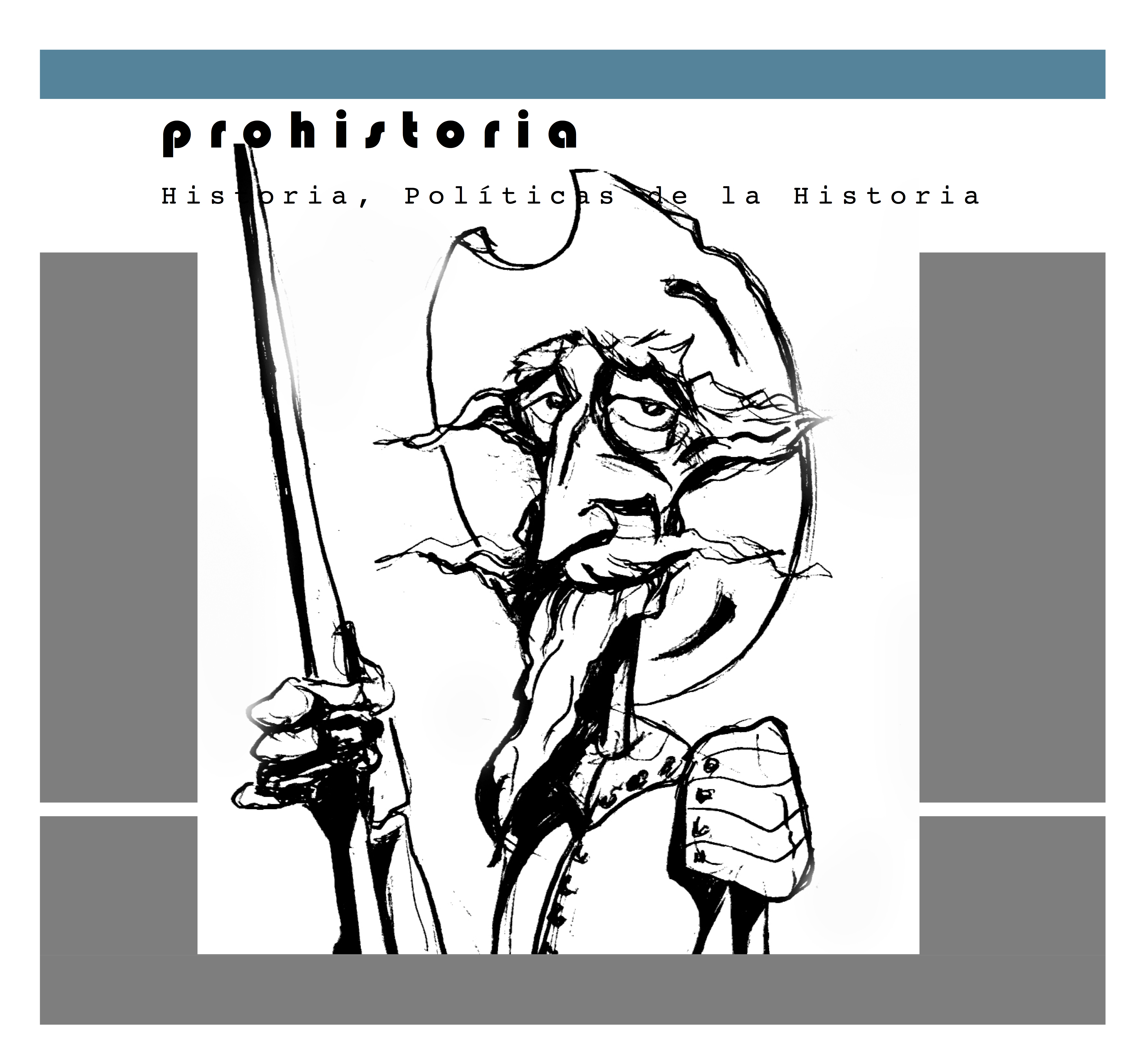A organização da violência militar no século 21
DOI:
https://doi.org/10.35305/prohistoria.vi35.1413Palavras-chave:
Coerción, Ideología, Solidaridad Grupal, Poder Organizativo, Violencia Militar, GuerraResumo
O artigo analisa as bases sociológicas da violência militar no século XXI. Na primeira parte, são debatidas criticamente as três abordagens contemporâneas dominantes na explicação da violência organizada: a) a perspectiva do declínio da violência, b) a abordagem das “novas guerras” ec) a abordagem do deslocamento tecnológico . Argumenta-se que, apesar de suas forças indiscutíveis, essas perspectivas não fornecem uma interpretação adequada das mudanças sociais contemporâneas. Em particular, questiona-se sua ênfase na ruptura radical do caráter da violência militar contemporânea em comparação com outros períodos históricos. Na segunda parte, o artigo desenvolve uma visão alternativa, sociológica e de longo prazo, focada no papel dos poderes coercitivos, ideológicos e microinterativos na transformação da violência militar. Em oposição às três perspectivas dominantes, argumenta-se que a violência organizada no século 21 foi transformada, mas exibe ainda mais continuidade com os últimos três séculos do que se supõe. Especificamente, o impacto de longo prazo de três processos históricos que moldaram a dinâmica da violência militar é enfatizado: a burocratização cumulativa da coerção, a ideologização centrífuga e o envolvimento da micro-solidariedade.
Downloads
Referências
Alperovitz, Gar (1995). The Decision to Use the Atomic Bomb, New York: Albert Knopf.
Arkin, Ronald C. (2011). “Military Robotics and the Robotics Community’s Responsibility”, en Industrial Robotics, 38 (5): 1973.
Bauman, Zygmunt (2002). Society under Siege, Cambridge: Polity.
Bauman, Zygmunt (2006). Liquid Fear, Cambridge: Polity.
Bender, Jeremy (2015). “‘They’d love to do damage’: The FBI says ISIS wants to go after one of America’s biggest vulnerabilities”, en Business Insider UK. Disponible en: http://uk.businessinsider.com/isis-and-hacking-us-power-grid-2015-10?r=US&IR=T.
Bourke, Joanna (2000). An Intimate History of Killing, London: Granta.
Broadbridge, Anne (2008). Kingship and Ideology in the Islamic and Mongol Worlds, Cambridge: Cambridge University Press.
Childs, John (2005). “The Military Revolution I: The Transition to Modern Warfare”, en Townshend, Charles (ed.) The Oxford History of Modern Warfare, Oxford: Oxford University Press.
Cirillo, Pasquale y Taleb, Nassim (2017). “On the Statistical Properties and Tail Risk of Violent Conflicts”, en Physica A: Statistical Mechanics and its Applications [in press].
Clausewitz, Carl von (1997 [1832]). On War, Ware: Wordsworth.
Coker, Christopher (2013). Warrior Geeks, London: Hurst.
Collins, Randall (2008). Violence: A Micro-Sociological Theory, Princeton: Princeton University Press.
De Landa, Manuel (1991). War in the Age of Intelligent Machines. New York: Swerve Editions.
Della Porta, Donatella (2013). Clandestine Political Violence, Cambridge: Cambridge University Press.
Dolman, Everett (2015). Can Science End War? Cambridge: Polity.
Duffield, Mark (2001). Global Governance and the New Wars, London: Zed.
Elias, Nobert (2000[1939]). The Civilising Process: Sociogenetic and Psychogenetic Investigations, London: Blackwell.
Fazal, Tanisha M. (2014) “Dead Wrong? Battle Deaths, Military Medicine, and Exaggerated Reports of War’s Demise”, en International Security, 39 (1): 95-125.
Foucault, Michel (1975). Discipline and Punish. The Birth of Prison, London: Penguin.
Foucault, Michel (2003). Society Must Be Defended: Lectures at the College de France 1975-1976, New York: Picador.
Fry, Douglas S. (2007). Beyond War, Oxford: Oxford University Press.
Fry, Douglas S. y Sorderberg, Patrik (2013). “Lethal Aggression in Mobile Forager Bands and Implications for the Origins of War”, en Science 341 (6143): 270-273.
Gat, Azar (2013). “Is War Declining – And Why?”, en Journal of Peace Research, 50 (2): 149-157.
Gellner, Ernest (1983). Nations and Nationalism, Ithaca NY: Cornell University Press.
Giddens, Anthony (1986). The Nation-State and Violence, Cambridge: Polity.
Goldstein, Joshua (2011). Winning the War on War: The Decline of Armed Conflict Worldwide, New York: Dutton.
Grossman Dave (1996). On Killing: The Psychological Cost of Learning to Kill in
War and Society, Boston: Little, Brown.
Gudkov, Gennady (2015). “Russian Nomenklatura 5 Times Larger, More Privileged. More Dangerous than Soviet Predecessor”, The Interpreter, October 24, 2015; https://www.interpretermag.com/russian-nomenklatura-five-times-larger-more-privileged-and-more-dangerous-than-its-soviet-predecessor-gudkov-says/
Guthrie, R. Dale (2005). The Nature of Palaeolithic Art, Chicago: Chicago University Press.
Hall, John A. (1985) Powers and Liberties, London: Blackwell.
Hirst, Paul (2001). War and Power in the 21st Century, Cambridge: Polity.
Hixson Walter (2003). The American Experience in World War II: The Atomic Bomb in History and Memory, London: Routledge.
Holmes, Richard (1985). Acts of War, New York: Free Press.
Horgan, John (2012). The End of War, New York: McSweeney.
Kaldor, Mary (2003). Global Civil Society: An Answer to War, Cambridge: Polity.
Kaldor, Mary (2007). New and Old Wars: Organised Violence in a Global Era, Cambridge: Polity.
Kaldor, Mary (2013). “In Defence of New Wars”, en Stability 2 (1):4, http://doi.org/10.5334/sta.at
Kalyvas, Stathis (2001). “‘New’ and ‘Old’ Civil Wars: A Valid Distinction?”, en World Politics, 54: 99-118.
Low, Bobbi (1993). “An Evolutionary Perspective on War”, en Zimmerman, William y Jacobsen, Harold (eds.) Behavior, Culture and Conflict in World Politics, pp. 13-55. Ann Arbor: University of Michigan Press.
Machiavelli, Niccolo (1997 [1532]). The Prince, Ware: Wordsworth.
Malešević, Siniša (2010). The Sociology of War and Violence, Cambridge: Cambridge University Press.
Malešević, Siniša (2013a). Nation-States and Nationalisms: Organisation, Ideology and Solidarity, Cambridge: Polity.
Malešević, Siniša (2013b). “Forms of Brutality: Towards a Historical Sociology of Violence”, en European Journal of Social Theory, 16 (3): 273 - 291.
Malešević, Siniša (2014). “Is War Becoming Obsolete? A Sociological Analysis”, en Sociological Review 62 (2): 65-86.
Malešević, Siniša (2015). “Where does Group Solidarity Come from? Gellner and Ibn Khaldun Revisited”, en Thesis Eleven, 128 (1): 85-99.
Malešević, Siniša (2016). “Nationalism and Military Power in 20th Century and Beyond”, en Schroeder, Ralph (ed) Global Powers: Mann’s Anatomy of the 20th Century and Beyond, Cambridge: Cambridge University Press.
Malešević, Siniša (2017). The Rise of Organised Brutality: A Historical Sociology of Violence, Cambridge: Cambridge University Press [edición en español: (2020) El auge de la brutalidad organizada. Una sociología histórica de la violencia, Universitat de València]
Mann, Michael (1986). The Sources of Social Power I: A History of Power from the Beginning to AD 1760, Cambridge: Cambridge University Press.
Mann, Michael (1993). The Sources of Social Power II: The Rise of Classes and Nation States 1760-1914, Cambridge: Cambridge University Press.
Mann, Michael (2012). The Sources of Social Power III: Global Empires and Revolution, 1890-1945, Cambridge: Cambridge University Press.
Mann, Michael (2013). The Sources of Social Power IV: Globalizations 1945-2011, Cambridge: Cambridge University Press.
Mearsheimer, John J. (2001). The Tragedy of Great Power Politics, New York: W.W. Norton.
Meyer, John; Boli, John; Thomas, George y Ramirez, Francisco (1997). “World Society and the Nation-State”, en American Journal of Sociology 103 (1): 144-81.
Meyer, John; Ramírez, Francisco y Soysal, Yasemin Nuhoḡlu (1992). “World Expansion of Mass Education, 1870-1970”, en Sociology of Education 65: 128-49.
Midlarsky, Manus (2011). Origins of Political Extremism: Mass Violence in the Twentieth Century and Beyond, New York: Cambridge University Press.
Morris, Ian (2014). War! What is it Good For?: Conflict and the Progress of Civilization from Primates to Robots, New York: Berghahn Books.
Mueller, John (2009). “War Has Almost Ceased to Exist: An Assessment”, en Political Science Quarterly. 124 (2): 297-321.
Munkler, Herfried (2004). The New Wars, Cambridge: Polity.
Newman, Edward (2004). “The ‘New Wars’ Debate: A Historical Perspective is Needed”, en Security Dialogue. 35 (2): 173-189.
Pinker, Steven (2011). The Better Angels of Our Nature: Why Violence has Declined? New York: Allan Lane.
Sageman, Marc (2004). Understanding Terror Networks Philadelphia: University of Pennsylvania Press.
Singer, Peter Warren (2009). Wired for War: The Robotics Revolution and Conflict in the 21st Century. London: Penguin.
Singer, Peter Warren y Friedman, Allan (2014). Cybersecurity and Cyberwar: What Everyone Needs to Know, Oxford: Oxford University Press.
SIPRI Military Expenditure Database (2013). http://www.pgpf.org/Chart-Archive/0053_defense-comparison#sthash.cgDq2KLF.dpuf
Smith, Roger W. (1999). “State Power and Genocidal Intent”, en Chorbajian, Levon y Shirinian, George (eds). Studies in Comparative Genocide, London: Macmillan.
Thornborrow, Thomas y Brown, Andrew (2009). “Being Regimented: Aspiration, Discipline and Idenity Work in the British Parachute Regiment”, en Organizational Studies 30 (4): 355-376.
Tilly, Charles (1985). “War Making and State making as Organized Crime”, en Evans, Peter; Rueschemeyer, Dietrich y Skocpol, Theda (eds.) Bringing the State Back In, Cambridge: Cambridge University Press.
Tin-Bor Hui, Victoria (2005). War and State Formation in Ancient China and Early Modern Europe, Cambridge: Cambridge University Press.
Turner, Jonathan (2007). Human Emotions: A Sociological Theory, London: Routledge.
Virilio, Paul (1997). Pure War, New York: Semiotext(e).
Virilio, Paul (2006). Speed and Politics, Cambridge, MA: MIT Press.
Waltz, Kenneth (2008). Realism and International Politics, London: Routledge.
Weber, Max (1968). Economy and Society, New York: Bedminster Press.
White, R. W. (2000). “Issues in the Study of Political Violence: Understanding the Motives of Participants in Small Group Political Violence”, Terrorism and Political Violence, 12(1): 95-108.
Publicado
Como Citar
Edição
Seção
Licença

Este trabalho está licenciado sob uma licença Creative Commons Attribution-NonCommercial-ShareAlike 4.0 International License.
- Os autores retêm os direitos autorais e garantem à revista o direito da primeira publicação do trabalho, bem como uma Creative Commons Attribution 4.0 International License.
- Os autores podem estabelecer separadamente acordos adicionais para a distribuição não exclusiva da versão do trabalho publicado na revista (por exemplo, colocá-lo em um repositório institucional ou publicá-lo em um livro), com reconhecimento de sua publicação inicial nesta revista.
Copyright desta edição © Prohistoria. Historia, políticas de la historia












































